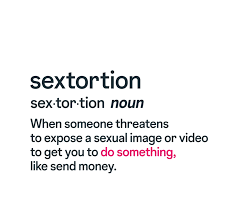Receiving a message from a stranger claiming to have explicit photos or videos of you can be terrifying. They demand money, threatening to expose your private moments to your family, friends, or colleagues. Your heart pounds, and panic sets in. This is sextortion; a rising form of cyber blackmail that preys on fear and vulnerability.
Sextortion is more common than many people realize, affecting individuals across all age groups and backgrounds. With the rise of digital communication, cybercriminals exploit social media, dating apps, and hacked personal accounts to target unsuspecting victims.
While teenagers and young adults are particularly vulnerable due to their active online presence, professionals, executives, and even older adults have also fallen prey.
Scammers often target people who fear reputational damage, such as those in high-profile careers or relationships, making them more likely to comply with demands. The psychological pressure and fear of exposure can push even the most cautious individuals into paying the blackmailer, despite warnings that giving in rarely stops the threats.
But should you pay the blackmailer or fight back? Let’s break it down.
What Is Sextortion?
Sextortion is a form of blackmail where cybercriminals threaten to share intimate content unless their demands, usually money, are met. These scammers often gain access to private images or videos through hacked devices, phishing schemes, or social engineering tactics. Some even fabricate claims, relying on fear to force victims into compliance.
Unlike traditional extortion, sextortion carries deep emotional consequences, making victims feel ashamed, scared, and isolated. But remember: you are not alone, and there are ways to fight back.

The Immediate Steps to Take If You’re Being Sextorted
If you receive a sextortion threat, your first instinct may be to panic or pay the ransom to make the problem go away. However, this is rarely the right approach. Here’s what you should do instead:
- Do Not Pay the Blackmailer
Paying does not guarantee that the blackmailer will stop. In many cases, they will demand more money or continue harassing you. - Stop All Communication
Do not engage with the blackmailer. Responding only confirms that you are a real person and a vulnerable target. - Secure Your Online Accounts
Change all your passwords, enable two-factor authentication, and check for any unauthorized access to your accounts. - Preserve Evidence
Take screenshots of messages, threats, and any contact information the blackmailer provides. This evidence can help investigators track down the perpetrator. - Report the Crime
Contact local law enforcement and report the case to cybercrime agencies. In many countries, sextortion is a criminal offense, and authorities may be able to assist you. - Get Professional Help
Organizations like Cyberhacks specialize in investigating and handling sextortion cases. They offer professional support, though their services are not free. However, their expertise can be invaluable in stopping the blackmailer and protecting your reputation.
Why You Shouldn’t Pay the Blackmailer
The fear of exposure is overwhelming, but giving in to a sextortionist’s demands rarely leads to resolution. Here’s why paying is a bad idea:
- No Guarantees: There’s no assurance the blackmailer will delete the content after receiving payment.
- You Become a Target: Once they know you’re willing to pay, they may return with higher demands.
- It Funds Criminal Activity: Paying encourages more sextortion scams, fueling the cycle of cybercrime.

How to Fight Back Against Sextortion
Instead of giving in, take proactive measures to protect yourself:
- Educate Yourself on Cybersecurity: Learn how to recognize phishing attempts and avoid risky online behaviors.
- Limit Personal Exposure: Be mindful of what you share online and with whom.
- Use Reputable Security Services: Consider using services like Cyberhacks that specialize in handling blackmail cases discreetly
The Role of Digital Investigators in Sextortion Cases
Cybersecurity professionals and digital investigators play a crucial role in tracking down and stopping sextortionists. Firms like Cyberhacks have experts who can:
- Trace the blackmailer’s identity and location
- Identify whether the threats are real or fabricated
- Work with law enforcement to shut down blackmail operations
- Provide legal and emotional support to victims
While these services come at a cost, they provide invaluable expertise in handling the situation discreetly.
Final Thoughts: Should You Pay or Fight Back?
The clear answer is: never pay. Giving in to a blackmailer’s demands only fuels their operation and puts you at greater risk. Instead, take immediate action to secure your accounts, report the crime, and get professional assistance if necessary.
Sextortion thrives on fear, but knowledge and action can break the cycle. If you or someone you know is facing this issue, remember that help is available. Stay strong, stay informed, and never let a blackmailer control your life.

